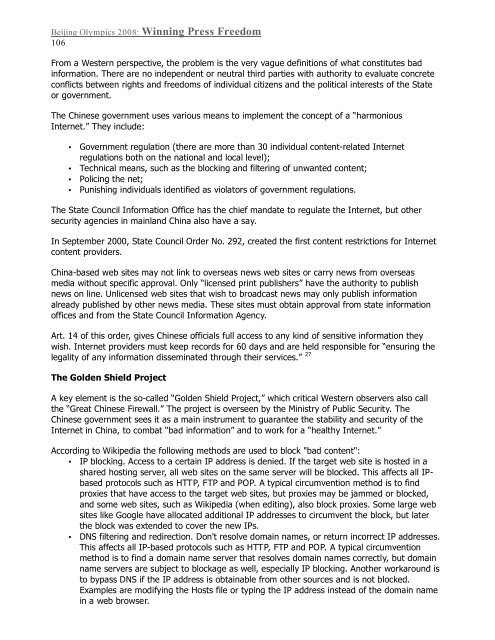Beijing Olympics 2008: Winning Press Freedom - World Press ...
Beijing Olympics 2008: Winning Press Freedom - World Press ...
Beijing Olympics 2008: Winning Press Freedom - World Press ...
You also want an ePaper? Increase the reach of your titles
YUMPU automatically turns print PDFs into web optimized ePapers that Google loves.
<strong>Beijing</strong> <strong>Olympics</strong> <strong>2008</strong>: <strong>Winning</strong> <strong>Press</strong> <strong>Freedom</strong><br />
106<br />
From a Western perspective, the problem is the very vague definitions of what constitutes bad<br />
information. There are no independent or neutral third parties with authority to evaluate concrete<br />
conflicts between rights and freedoms of individual citizens and the political interests of the State<br />
or government.<br />
The Chinese government uses various means to implement the concept of a “harmonious<br />
Internet.” They include:<br />
• Government regulation (there are more than 30 individual content-related Internet<br />
regulations both on the national and local level);<br />
• Technical means, such as the blocking and filtering of unwanted content;<br />
• Policing the net;<br />
• Punishing individuals identified as violators of government regulations.<br />
The State Council Information Office has the chief mandate to regulate the Internet, but other<br />
security agencies in mainland China also have a say.<br />
In September 2000, State Council Order No. 292, created the first content restrictions for Internet<br />
content providers.<br />
China-based web sites may not link to overseas news web sites or carry news from overseas<br />
media without specific approval. Only “licensed print publishers” have the authority to publish<br />
news on line. Unlicensed web sites that wish to broadcast news may only publish information<br />
already published by other news media. These sites must obtain approval from state information<br />
offices and from the State Council Information Agency.<br />
Art. 14 of this order, gives Chinese officials full access to any kind of sensitive information they<br />
wish. Internet providers must keep records for 60 days and are held responsible for “ensuring the<br />
legality of any information disseminated through their services.” 27<br />
The Golden Shield Project<br />
A key element is the so-called “Golden Shield Project,” which critical Western observers also call<br />
the “Great Chinese Firewall.” The project is overseen by the Ministry of Public Security. The<br />
Chinese government sees it as a main instrument to guarantee the stability and security of the<br />
Internet in China, to combat “bad information” and to work for a “healthy Internet.”<br />
According to Wikipedia the following methods are used to block "bad content":<br />
• IP blocking. Access to a certain IP address is denied. If the target web site is hosted in a<br />
shared hosting server, all web sites on the same server will be blocked. This affects all IPbased<br />
protocols such as HTTP, FTP and POP. A typical circumvention method is to find<br />
proxies that have access to the target web sites, but proxies may be jammed or blocked,<br />
and some web sites, such as Wikipedia (when editing), also block proxies. Some large web<br />
sites like Google have allocated additional IP addresses to circumvent the block, but later<br />
the block was extended to cover the new IPs.<br />
• DNS filtering and redirection. Don't resolve domain names, or return incorrect IP addresses.<br />
This affects all IP-based protocols such as HTTP, FTP and POP. A typical circumvention<br />
method is to find a domain name server that resolves domain names correctly, but domain<br />
name servers are subject to blockage as well, especially IP blocking. Another workaround is<br />
to bypass DNS if the IP address is obtainable from other sources and is not blocked.<br />
Examples are modifying the Hosts file or typing the IP address instead of the domain name<br />
in a web browser.





